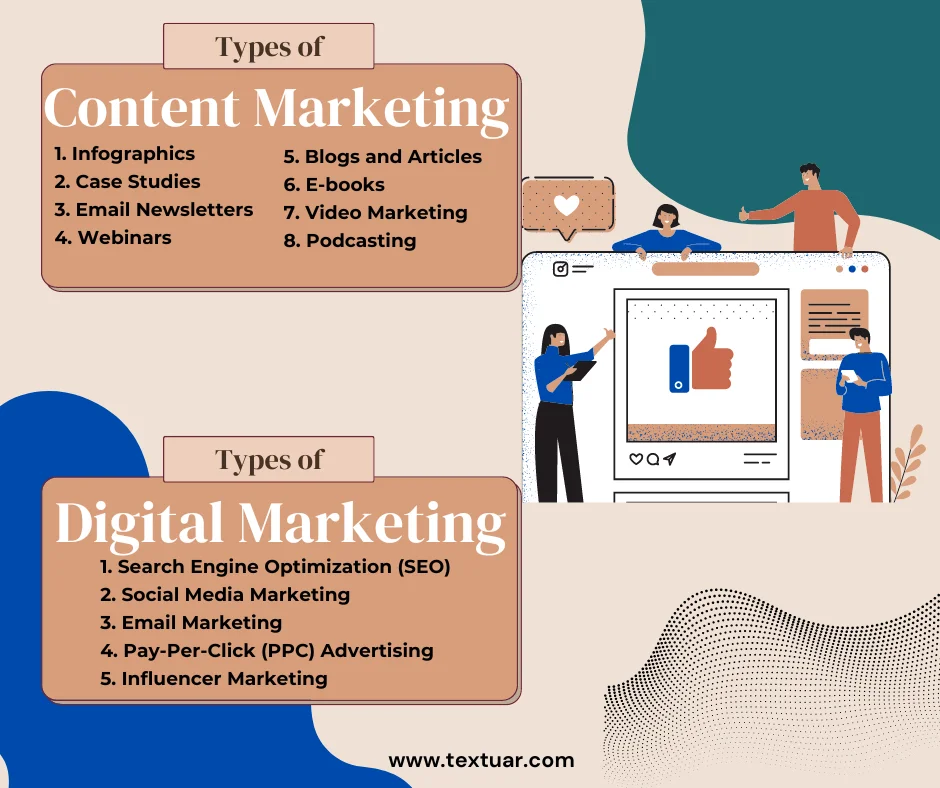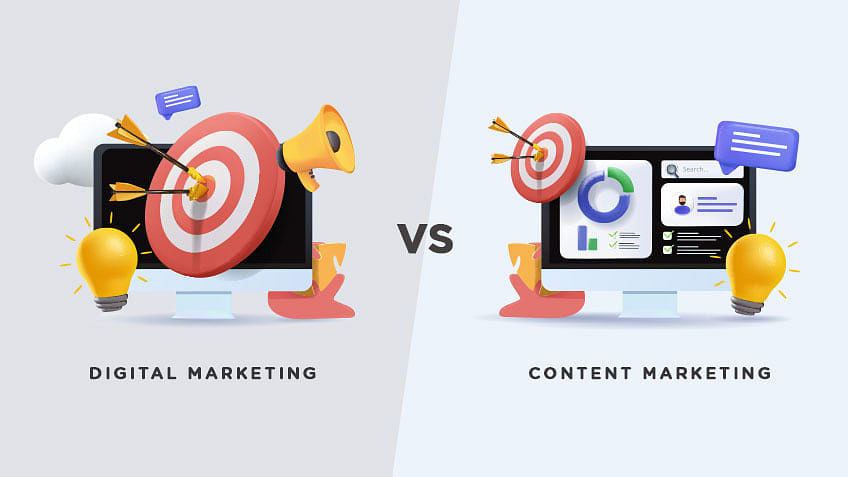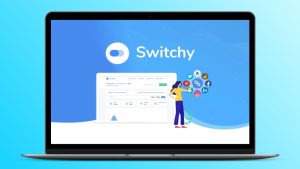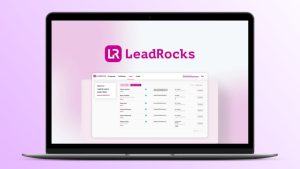Content marketing and digital marketing are often seen as similar. But they are not the same.
Understanding the differences can help you decide which strategy suits your needs best. Comparing content marketing and digital marketing is crucial for businesses today. Each has its unique benefits and methods. Content marketing focuses on creating valuable content for the audience.
Digital marketing, on the other hand, uses various online channels to promote products. Knowing the distinctions between these strategies helps in making informed decisions. This guide will explain both approaches, showing how each can be used effectively. Whether you are a business owner or a marketer, this comparison will give you insights to choose the right path. Let’s dive in and explore the world of content marketing and digital marketing.
Table of Contents
Key Differences
Content Marketing and Digital Marketing are often confused. Both aim to grow businesses, but they do so in different ways. Understanding their key differences helps in choosing the right strategy. Below, we delve into the distinct aspects of each.
Goals And Objectives
Content Marketing focuses on building relationships. Its goal is to engage the audience through valuable content. It nurtures trust and loyalty over time. Digital Marketing aims to drive sales and conversions. It targets a broader audience quickly. The objective is immediate action.
Tools And Techniques
Content Marketing uses blogs, videos, and infographics. These tools educate and inform the audience. Techniques include storytelling and SEO. Digital Marketing uses ads, email campaigns, and social media. Tools include PPC, SEM, and display ads. Techniques involve targeting and analytics.

Credit: textuar.com
Content Marketing Benefits
Content marketing offers numerous benefits. It helps attract and retain customers. Below are key advantages of content marketing.
Building Brand Awareness
Content marketing is excellent for building brand awareness. By sharing valuable content, you can reach a wider audience. This helps people recognize your brand. Regularly posting high-quality content establishes your brand as an authority. People start to trust your company. Trust leads to brand loyalty.
Consider using different formats to maximize reach:
- Blog posts
- Infographics
- Videos
- Social media updates
Each format appeals to different audiences. Diversifying content types increases brand exposure. More people will notice your brand. This builds recognition and trust over time.
Enhancing Customer Engagement
Content marketing also enhances customer engagement. Engaging content keeps readers on your site longer. This interaction builds a connection. Customers feel valued when you provide helpful information. They are more likely to engage with your brand.
Engaging content can take several forms:
- Interactive quizzes
- Surveys
- Comments sections
- Discussion forums
These methods invite users to participate. This participation deepens their connection to your brand. Engaged customers are more likely to return. They also share your content, expanding your reach.
Digital Marketing Benefits
Understanding the benefits of digital marketing is crucial for businesses today. It offers a range of advantages that can significantly enhance your marketing efforts.
Wider Audience Reach
One of the primary benefits of digital marketing is its ability to reach a wider audience. Unlike traditional marketing, digital strategies are not bound by geographical limitations. This means you can connect with potential customers from across the globe.
For example, social media platforms like Facebook and Instagram have billions of users. This gives your brand an opportunity to engage with a massive audience. Furthermore, search engine optimization (SEO) allows your website to appear in search results worldwide.
This global reach can lead to more traffic, more leads, and higher sales. This makes digital marketing a powerful tool for business growth.
Measurable Results
Another significant advantage of digital marketing is the ability to measure results accurately. With traditional marketing, it’s often challenging to know how effective your campaigns are. Digital marketing, on the other hand, provides detailed metrics.
Platforms like Google Analytics and social media insights offer real-time data. This includes information on website traffic, user behavior, and conversion rates.
| Metric | Description |
|---|---|
| Website Traffic | The number of visitors to your site |
| Conversion Rate | The percentage of visitors who take a desired action |
| Engagement Rate | How much users interact with your content |
These metrics allow you to track your campaign performance. This makes it easier to adjust strategies for better results.
Thus, digital marketing offers a clear picture of your return on investment (ROI).
Challenges Of Content Marketing
Balancing content marketing with digital marketing poses unique challenges. Ensuring consistent quality across various channels requires significant effort. Each platform demands tailored strategies, making cohesive branding difficult.
Content marketing can be highly effective, but it does come with its own set of challenges. These challenges can hinder your marketing efforts if not properly addressed. Let’s delve into two major issues: Time-Consuming and Consistency Issues.Time-consuming
Creating high-quality content demands a significant investment of time. Crafting well-researched articles, engaging videos, or informative infographics takes hours.| Task | Estimated Time |
|---|---|
| Research | 2-4 hours |
| Writing | 3-5 hours |
| Editing | 1-2 hours |
| Publishing | 1 hour |
Consistency Issues
Maintaining a consistent content schedule is crucial. It keeps your audience engaged and helps build trust. But consistency can be hard to achieve.- Staff turnover can disrupt content schedules.
- Creative blocks can delay content creation.
- Resource limitations can impact output.
Challenges Of Digital Marketing
Digital marketing offers immense opportunities, but it also comes with its own set of challenges. Navigating through these obstacles is crucial for the success of any digital marketing campaign. Two significant challenges include high competition and ad fatigue.
High Competition
The digital landscape is highly competitive. Many businesses are vying for the same audience. This makes it hard to stand out. High competition means higher costs for ads. It also means that your content must be unique and engaging. Without a strong strategy, your efforts may get lost in the crowd.
Ad Fatigue
Ad fatigue is another significant challenge. Users see many ads every day. Eventually, they become tired of seeing the same ads repeatedly. This leads to lower engagement. Ad fatigue can also result in higher costs per click. To combat this, you need to regularly refresh your ads. Use different visuals and messages to keep your audience interested.
When To Use Content Marketing
Content marketing is a powerful strategy. It focuses on creating valuable content to attract and engage audiences. This approach can be particularly effective in various scenarios. Let’s explore when to use content marketing.
Long-term Growth
Content marketing works well for long-term growth. It builds trust and authority over time. Regularly posting high-quality content keeps your audience engaged. They come back for more. This steady engagement can lead to increased loyalty and conversions. It’s a slow process. But it pays off in the long run.
Niche Audience Targeting
Content marketing is great for targeting niche audiences. You can create content tailored to specific interests. This helps attract the right audience. They feel understood. They are more likely to engage with your brand. This targeted approach ensures your message reaches those who care.
When To Use Digital Marketing
Digital marketing suits various strategies like SEO, social media, and email campaigns. Content marketing focuses on creating valuable, relevant content to attract and engage audiences. Both methods aim to boost brand visibility and drive conversions.
Digital marketing can be a powerful tool for businesses. It offers many strategies to reach potential customers. Understanding when to use digital marketing is key.Immediate Results
Digital marketing methods often deliver quick outcomes. Paid ads, for example, can drive traffic instantly. This is useful for promotions or special offers. Social media campaigns also show fast engagement. Email marketing can generate immediate responses. Traditional marketing methods take longer. Flyers or billboards might take weeks to see results. Digital marketing provides a faster way to measure success.Broad Audience Targeting
Digital marketing reaches a wide audience. Online platforms have billions of users. This allows businesses to target potential customers globally. Social media ads can reach diverse groups. Search engine marketing targets users based on search intent. Content marketing focuses on specific niches. Digital marketing can cast a wider net. This is ideal for brands seeking mass awareness. It helps in building a large customer base quickly. In summary, digital marketing is beneficial for rapid results and reaching a broad audience. It provides tools to engage potential customers effectively. Understanding its strengths helps businesses grow. “`
Credit: www.linkedin.com
Case Studies
Case studies provide real-world examples of how businesses achieve success through various marketing strategies. By examining these case studies, we gain insights into the effectiveness of both content marketing and digital marketing. Let’s explore some remarkable campaigns that highlight the power of each.
Successful Content Marketing Campaigns
Content marketing focuses on creating and sharing valuable content to attract a target audience. Here are some noteworthy examples:
- Red Bull’s Stratos Jump: Red Bull created engaging content around Felix Baumgartner’s space jump. They shared videos, articles, and social media updates, captivating millions. This content marketing campaign boosted brand visibility and engagement.
- HubSpot’s Blog: HubSpot’s blog offers valuable insights on marketing, sales, and customer service. They publish high-quality articles, eBooks, and guides. This consistent content marketing approach has established HubSpot as an industry leader.
- GoPro’s User-Generated Content: GoPro encourages users to share videos captured with their cameras. They feature the best content on their website and social media. This strategy boosts brand loyalty and showcases product quality.
Successful Digital Marketing Campaigns
Digital marketing encompasses various online strategies to promote products or services. Let’s look at some successful digital marketing campaigns:
- Old Spice’s “The Man Your Man Could Smell Like”: Old Spice used humorous and engaging videos to transform their brand image. The campaign went viral, leading to a significant increase in sales and online presence.
- Airbnb’s Social Media Campaign: Airbnb leveraged social media platforms to share user experiences and travel stories. They used hashtags and interactive posts to engage with their audience, resulting in increased brand awareness and bookings.
- Dollar Shave Club’s Viral Video: Dollar Shave Club created a simple yet effective video explaining their product. The video went viral, attracting millions of views and subscribers, revolutionizing their market reach.

Credit: www.linkedin.com
Frequently Asked Questions
What Is Content Marketing?
Content marketing is the strategy of creating valuable content to attract and engage a target audience. The goal is to build a relationship with the audience, driving profitable customer action.
How Does Digital Marketing Work?
Digital marketing uses online channels like social media, search engines, and email to promote products or services. It targets specific audiences, tracks performance, and optimizes strategies for better results.
Differences Between Content And Digital Marketing?
Content marketing focuses on creating valuable content to engage audiences. Digital marketing includes various online strategies, including content marketing, to promote a brand and drive sales.
Is Content Marketing Part Of Digital Marketing?
Yes, content marketing is a subset of digital marketing. It involves creating and sharing valuable content as part of a broader digital marketing strategy.
Conclusion
Choosing between content marketing and digital marketing depends on your goals. Content marketing focuses on creating valuable content. Digital marketing uses multiple online channels to reach audiences. Both strategies have their strengths. Content marketing builds trust and authority. Digital marketing offers broader reach and faster results.
Consider your business needs and audience. A mix of both often works best. Stay adaptable and keep measuring results. This way, you can refine your approach for maximum impact.




